I love to get inside the mind of a great volleyball coach. This interview will show you how they think, and give you some great advice about how to make the team, how to train, and how to get noticed by college scouts. Tom Houser is a volleyball coach in Virginia and has been coaching since 1985. He has a tremendous winning record, and has produced a long line of collegiate players and others who went on to coach volleyball. I am honored to present this interview.
What is your passion/motivation to be a volleyball coach?
Tom Houser: I used to be motivated by the competition. Now, it’s just so much fun. Coaching is like being an artist. If you work hard at it, do the right things, are careful, etc., you can create something beautiful. Will it always be a masterpiece? Of course not. But I intend for them all of my teams to be masterpieces. And, then, sometimes, the coach and team together can create a once-in-lifetime priceless memory.
When one season is over, I can’t wait for the next.
Many of our readers are looking for advice on how to make their school volleyball team. What advice would you give them from a volleyball coach’s point-of-view?
Tom Houser: Making the volleyball team has 8 parts.
I) Love for the game is something coaches would like to see, but for middle school teams (and many JV teams), this quality hasn’t 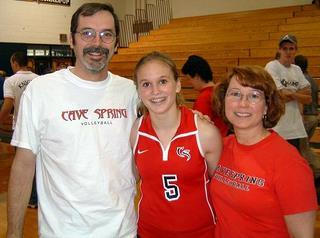 developed in the kids yet. If an experienced player is trying out and she exudes “I LOVE THIS GAME, and I’ll do anything for the team,” then she is more likely to make the team than the girl who thinks “Yeah, I like this, but I’m not really excited by it.” The 2nd girl is more likely to quit, have a bad attitude, want to miss practices, etc. and coaches KNOW that!
developed in the kids yet. If an experienced player is trying out and she exudes “I LOVE THIS GAME, and I’ll do anything for the team,” then she is more likely to make the team than the girl who thinks “Yeah, I like this, but I’m not really excited by it.” The 2nd girl is more likely to quit, have a bad attitude, want to miss practices, etc. and coaches KNOW that!
II) Coachability is important at all levels: middle, JV, high, college. I coached the conference player of the year one season. Two years later she was history. Attitude, attitude, attitude. At my camps, I now tell the story of “Attitude Setter.” Many coaches are willing to lose more games in order to protect their team from the un-coachable brats.
III) Skilled Players are nice to have!! In fact, skill is the most important factor in winning many sports! It’s often more important than height, strength, athleticism, etc. For example, a team of 5’6″ 180 pound greatly skilled volleyball players will have winning seasons in most high school conferences. And they will routinely beat the taller, stronger, more athletic teams. Now, let’s talk about a few things you didn’t mention.
IV) Playing Experience! If a volleyball coach knows that a girl has played a number of years, especially if she’s played travel, then she stands out like a shining star. Not only is this girl usually highly skilled for her age, but she has taken the extra time (and a PILE of her parent’s money) to improve her game. Kids who have a lot of playing experience create championship teams, and those kids are extremely hard to cut.
V) Athleticism! On our travel team last year, we kept a girl who wasn’t very skilled, tall or experienced. But we thought she was freakishly athletic. So we took a chance on her. I know that it doesn’t seem fair, but when a coach figures a player can do something better after one month than another can after 3 years, the volleyball coach may keep the new girl. Gosh, if she stays with the program just 2 or 3 months, what incredible plays will we see?
VI) Loyalty and Teamness! This is a hard one for the volleyball coach to judge. But you may want to consider coming to tryouts wearing something that’s in team colors. I’ve known some girls to bring goodie bags to tryouts, or invite the team to her house after practice, or have her parents bring a cooler of PowerAdes. I know that this appears as though you’re sucking up; but, to me it appears as though you really really want to make the team.
VII) Energy! A girl who comes to tryouts awake, alert and ready to go always gets my attention. Some people call kids like this obnoxious. But I call them energetic and a joy to coach. A girl who’s complaining and whining gets my attention too: “I don’t think I want 3 months of this chic.”
VIII) Effort. I’ll tell my girls, “If you don’t make the play in practice, you won’t make it in a game either.” I guess what I could say at tryouts is, “If you don’t attempt to make the play this week, I may not be seeing you next week.” So give it all you’ve got. If you go for it, you’ve got nothing to lose. But if you save your effort for later, you may not make the team.
These steps will also help you stand out from the crowd at tryouts!
You have a long history of having players that went on to play collegiate volleyball and also became volleyball coaches. What can players do to increase their chances of being recruited for college?
Tom Houser: Here is my advice to parents.
1. The parents will have to search the websites of the colleges, finding which schools offer what their daughter wants to study, which are the right size, etc. This is the “college matching” process. If you pay the recruiters to do it, it’ll be just like an Eharmony thing! Ha Ha, you know, that website that finds a soulmate for you? I’m sure the recruiters will give you a 100-item questionnaire and they’ll find her best matches. The questions will ask about her preferences in college size, ratio of men to women, distance from home, what she wants to study, college atmosphere (rural, urban, etc.), her GPA, class rank, SAT scores, and on and on and on.
If the parents are going to do this process themselves, they have to be ready for the daughter to complain about the school colors, the long-sleeve jerseys, the size of the gym, etc. When I’m helping players, I respond to these whines with, “You know, you’ll be spending 95% of your time in class, in your dorm room, in the library, or laying under a tree. How really important are the school colors?”
2. A skills tape will have to be made. Maybe the girl’s school coach or club volleyball coach can do it. The parents may have to hire someone. Copies will have to be made and it will need to be to be sent to every volleyball coach of every college that the girl is considering. I sell DVD’s on www.coachhouser.com. Let me know if you want a copy of my stepdaughter’s skills tape. When she was a sophomore, I did it. When she was a junior, her mom decided to go pro. Ha ha, I can send you a copy of both.
3. A letter will have to accompany the tape, but that’s the easiest part of the process. The letter will include every bit of info that the parents can imagine a college volleyball coach would want to know. If anyone would like to see the letter that I included with my stepdaughter’s video, I can attach it to an email. Let me know at coachhouser@yahoo.com
4. The girl should contact the volleyball coach from each school about once every 10 days. This is how a girl lets the college coach know that is really, really interested. Sure, if the girl is 6’3”, the coach may contact her, but this is not typical. The vast majority of volleyball families have to promote their own. If parents wait for the coaches to contact them, their daughter’s future in college volleyball is apt to disappear while they are waiting.
5. The player needs to visit all the schools that she remains interested in. All of us have known players who have enrolled in a school, then regretted their decision after just a few weeks of classes. This can be avoided. In fact, I think it’s inexcusable.
6. The girl will want to see the volleyball team play. She and her family should tell the volleyball coach ahead of time that they will be coming. This will allow the volleyball coach to budget time to talk to them. The coach may even want the girl to meet the team, eat a meal with the team, stay overnight with some team members, etc.
A lot of players are looking for volleyball camps to improve their skills. What camps do you recommend?
Tom Houser: Warning #1: A slick brochure means nothing. I used to try to put out a nice one, but it was not worth the time.
Warning #2: If the camp director’s college teams have been successful, that means very little also. There is only a slight correlation between a winning coach and a positive camp experience for your players! Successful coaches don’t necessarily direct good camps any more than successful players make good coaches. Heck, the coach with the great record could be an incredible recruiter. So how does that make him/her a great camp director?
Warning #3: Don’t push a camp onto your players because that’s where you went to school or because you just saw them win the D1 National Championship on TV last month. Try to pick a camp that’s good for your team! There must be a better reason to support your camp choice than, “I went to school there. Trust me!”
But here’s a list of how to pick a camp that’s appropriate for your players.
Summer Camp Rule #1: Cost
This must be our #1 criteria in selecting a camp. Don’t select one that makes the parents gasp. OK, sure, I know you often get what you pay for. But, that’s not always the case. And as I wrote in an article a few years ago, (a) you can find cheaper camps that are very high quality and (b) would you rather go to the cheaper camp? Or not go to one at all?
Before you require the parents to fork out $1000 for two out-of-state university camps, would you rather 40% of your players stay home? Or would rather make a less expensive choice and have 90% participation?
Summer Camp Rule #2: Age Appropriate
Sure, you can persuade your 14’s to play 16’s. But will the camp work with your youngest? Very very few 12 year olds will be comfortable shoved into a 14’s division. Your elementary and early middle school girls must have their own division, or they will be miserable, and their parents’ money will be wasted.
Is it too far away from home for your youngest? Most 14’s can stay 100 or 200 miles from home, but many of the younger ones are not mature enough yet. (And their parents may not allow it!) So, for your 12’s and 13’s, a local day camp is probably adequate. In other words, I would take very few of my girls out of town until they reached about 13, or maybe 14.
Summer Camp Rule #3: The Reputation
 A camp’s reputation is what makes some camps ridiculously popular, and what shuts other camps down: The recommendations of those who have been there should help you decide which camps to attend.
A camp’s reputation is what makes some camps ridiculously popular, and what shuts other camps down: The recommendations of those who have been there should help you decide which camps to attend.
And by picking a camp that your players will really enjoy, you will earn the accolades of your players and parents!
Talk to as many coaches as you can about the camps your considering. Here is a list of questions that I would ask.
- Did your players like the food? Was there enough selection?Were your players busy?
- Or did they have 6 hours of day with nothing to do? Were they challenged?
- Did the girls feel safe? Was there adequate supervision?
- Were the camp directors knowledgeable? Or were many of them 19, 20, 21 year-olds just “putting in their time”?
- Were the accommodations adequate? (In 1999, I took my girls to a camp where the high temp was 100 degrees ever day and there were no air conditioned rooms and only 1 air conditioned gym. They were so happy to leave, and they begged me never to take them back.)
- Were the campers treated well? Were they complimented and made to feel special? Or did the directors lose patience with the kids?
- Was the camp run well? Or were the directors wasting time trying to figure out what to do next? Did the girls spend half of their day in a dorm room?
- Do you think the camp is a good value? Or does it appear to be a cash-cow for the directors?
Summer Camp Rule #4: Skill Appropriate
Does the camp have a division that meets the needs of your oldest? Don’t take your girls — who have been playing club ball since the 7th grade — to a camp where they are the only advanced players in attendance. They’ll want to bolt after the 1st day, and I wouldn’t blame them.
Summer Camp Rule #5: Coach To Player Ratio.
A low coach-camper ratio is over-rated. That’s why it is 5th.
All camp brochures rave about their low coach-camper ratio. But just because a camp has one volleyball coach for every 5 campers, that doesn’t mean those coaches are teaching the campers anything! In fact, the “coaches” are often nothing but the women who play volleyball at the college. And some of them are no more teachers of the game, than am 6’10”. They’re just because they’re forced to by the head volleyball coach, or because they’re earning $8 an hour.
On the other hand, many girls have been to “specialty” camps where there are 20 setters per 1 coach. Don’t send your players to that either. That’s why “Rule #3” is so vital!
Summer Camp Rule #6: Location.
In 1996, I took my players to a one-day clinic at a college in an inner-city. They stared in amazement at the scenery. In that one day, we saw students who were high on drugs, students that had dog collars tattooed around the necks, students with dozens of piercings (this was 1996, not 2006), and students with their growling Rottweilers on leashes. I vowed never to take my small town kids back there again.
Finally. It’s time for all you coaches to make your decisions about summer camps. Don’t let your kids down! Don’t let the parents down! Do your homework. Do more homework than is necessary. Then, if the camp doesn’t work out, you want to be able to say, “I asked the camp directors about this, and they assured me it wouldn’t be like this. We aren’t going back.”
You don’t want to have to say, “Oh, man, that didn’t work out. Let’s try another one next year.”
What has been your most memorable moment as a volleyball coach?
Tom Houser: There are dozens. I remember visiting a college for the first time when one of my players was on the college roster. I remember the day that same woman said, “I want to be your JV coach next year.” I remember being snowed in, we all had to stay in a motel in Gretna Virginia. The memories are limitless.
The best ones: When our team was successful against teams where we were ridiculous underdogs. In 2005, my club team was the 15’s B team. At our first tournament, who was on our 2nd court? Our club’s A team. We beat them in three. Unbelievable. The stories like that still make me smile.
I can’t wait to try to do it all again!
You also offer several ebooks on coaching and volleyball drills on your website. How will these ebooks help other coaches?
Tom Houser: These books are not only x’s and o’s. They will help volleyball coaches with their own personal issues. Some coaches need to hear, “YOU ARE IN CHARGE!” and some need to hear. “No, there is not a 17 year-old who has more attitude than you do. Yes, you can allow it, but you don’t have to.” So, a lot of the articles in the ebooks will have coaches saying, “OK, we can implement this!” But there’s a lot of information that will have a volleyball coach smiling and saying, “Oh yeah!” He’s right. I can do that and I will!”
I am thankful that volleyball coach Tom Houser took time to do this interview for us. Please check out his website at www.coachhouser.com for more information from a great volleyball coach.
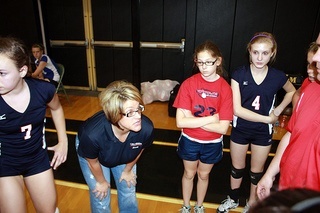 Too frequently, I see coaches and hitters that expect the setter to know where the ball should be and how they are playing. during practice and matches, hitters should provide feedback to the setter as to the last set. Was it too high or too tight to the net? Too wide? The feedback process must be constant in order to achieve optimum results.
Too frequently, I see coaches and hitters that expect the setter to know where the ball should be and how they are playing. during practice and matches, hitters should provide feedback to the setter as to the last set. Was it too high or too tight to the net? Too wide? The feedback process must be constant in order to achieve optimum results.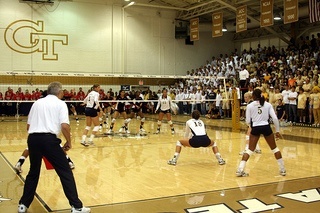 An offense like this is so predictable and easy for the defense to adjust and get two or even three blockers up. If this is happening, this is not your hitters’ fault. This is an issue with the setter and training is needed.
An offense like this is so predictable and easy for the defense to adjust and get two or even three blockers up. If this is happening, this is not your hitters’ fault. This is an issue with the setter and training is needed.
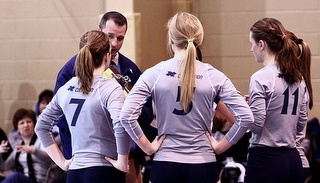 If you need some new volleyball drills to help you in your practices, then we have the information you are looking for. This section on our website has
If you need some new volleyball drills to help you in your practices, then we have the information you are looking for. This section on our website has  developed in the kids yet. If an experienced player is trying out and she exudes “I LOVE THIS GAME, and I’ll do anything for the team,” then she is more likely to make the team than the girl who thinks “Yeah, I like this, but I’m not really excited by it.” The 2nd girl is more likely to quit, have a bad attitude, want to miss practices, etc. and coaches KNOW that!
developed in the kids yet. If an experienced player is trying out and she exudes “I LOVE THIS GAME, and I’ll do anything for the team,” then she is more likely to make the team than the girl who thinks “Yeah, I like this, but I’m not really excited by it.” The 2nd girl is more likely to quit, have a bad attitude, want to miss practices, etc. and coaches KNOW that! A camp’s reputation is what makes some camps ridiculously popular, and what shuts other camps down: The recommendations of those who have been there should help you decide which camps to attend.
A camp’s reputation is what makes some camps ridiculously popular, and what shuts other camps down: The recommendations of those who have been there should help you decide which camps to attend.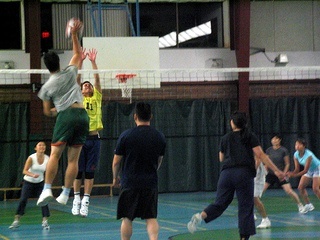 Teaching proper
Teaching proper  Use these sections to help you learn how to teach the various skills that will teach the children the
Use these sections to help you learn how to teach the various skills that will teach the children the